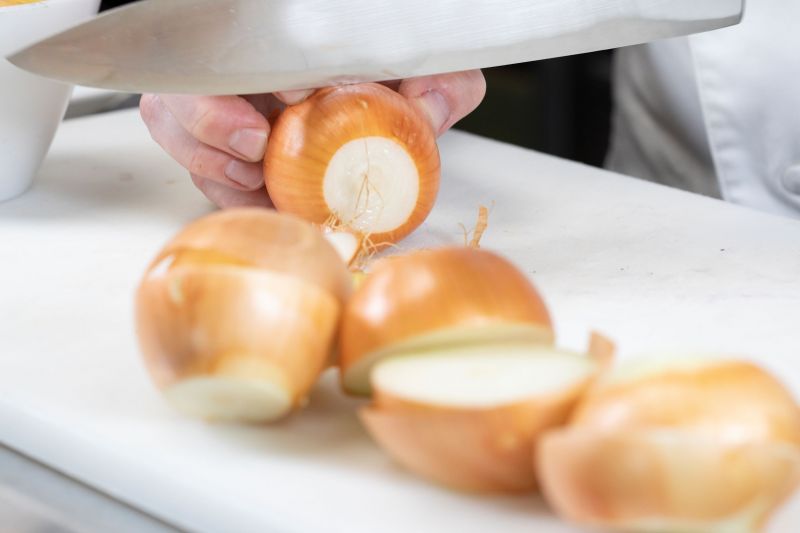an onion a day, keeps the doctor away
At first sight, the Dutch onion might seem a bit ordinary, however, it's a very healthy vegetable that can help fight off a cold or the flu. It's full of extremely important fibres, minerals, vitamins and antioxidants such as quercetin, flavonoids and selenium.
Although all vegetables are important for one's health, onions provide additional, specific benefits. Adding more onions to your diet is a fairly simple way to improve your health. source: https://www.healthshots.com/healthy-eating/superfoods/10-health-benefits-of-eating-raw-onions/The medicinal properties of onions have been known for centuries and they have been used for the treatment of ailments such as headaches, colds and shortness of breath. For example, eating raw onions helps to relieve bronchitis and, to relieve shortness of breath, you can put a cut onion on your bedside table.
Packed with nutrients
The nutrient density in onions is high. This means they are low in calories and high in vitamins and minerals. The main minerals in onions are phosphor, calcium and especially potassium. The most important micro elements are iron, boron, strontium, copper, zinc and manganese. Onions have a high concentration of vanadium. (source: https://mergenmetz.nl/wp-content/uploads/2014/02/Rapport-WUR-ui.pdf)This plays an important role in the growth of bone cells and cartilage cells and is involved in cholesterol metabolism. A medium-sized onion contains an average of 90% water and is rich in vitamins and fibre including pectin. Holland Onions are rich in vitamin C, a nutrient that is involved in the regulation of the immune system, the collagen production, tissue repair and iron absorption. Onions also contain a lot of vitamin B.

Good for the heart
Onions contain antioxidants and substances that are anti-inflammatory, reduce triglyceride and lower cholesterol levels - factors that can help reduce the risk of heart failure. Onions are rich in quercetin, an important flavonoid antioxidant that neutralises free radicals.
(source: https://pubmed.ncbi.nlm.nih.gov/26328470/).
Chock full of antioxidants
Antioxidants are substances that prevent oxidation. Oxidation causes cell damage and contributes to diseases. Onions are a rich source of antioxidants - they contain even more than 25 different variants of flavonoids antioxidants. (source: https://pubmed.ncbi.nlm.nih.gov/17997520/). Red onions in particular contain anthocyanin - special plant pigments - which also gives these onions there purple-red colour.
Lowers blood sugar level
Eating onions daily can help reduce high blood sugar levels. A study of 42 people with type II diabetes found that eating 100 grams of fresh red onions lowered the fasting blood sugar level by approximately 40 mg/dl after 4 hours. (source: https://www.ncbi.nlm.nih.gov/pmc/articles/PMC2978938/). Specific compounds found in onions such as quercetin and sulphur compounds, have anti-diabetic effects.
Antibacterial qualities
Onions can fight potentially harmful bacteria. Furthermore, onion extracts seem to slow the growth of the bacteria Vibrio cholerae, a bacteria that is a serious public health issue in developing countries. Quercetin from onions seems to be highly effective against bacteria. (source: https://pubmed.ncbi.nlm.nih.gov/21702293/). A lab study showed that quercetin extracted from yellow onions successfully slowed the growth of H. pylori and Methicillin-resistant Staphylococcus aureus (MRSA).
Improves digestion
Onions are also a rich source of prebiotics. These are necessary for healthy intestines. Prebiotics are non-digestible types of fibre that are broken down by beneficial intestinal bacteria. If beneficial bacteria feed on prebiotics they produce short-chain fatty acids. Research has shown that these fatty acids improve intestinal health and also boost the immune system. (source: https://www.mlds.nl/hoe-gezond-is-jouw-buik/artikelen/zo-gezond-zijn-prebiotica/).
